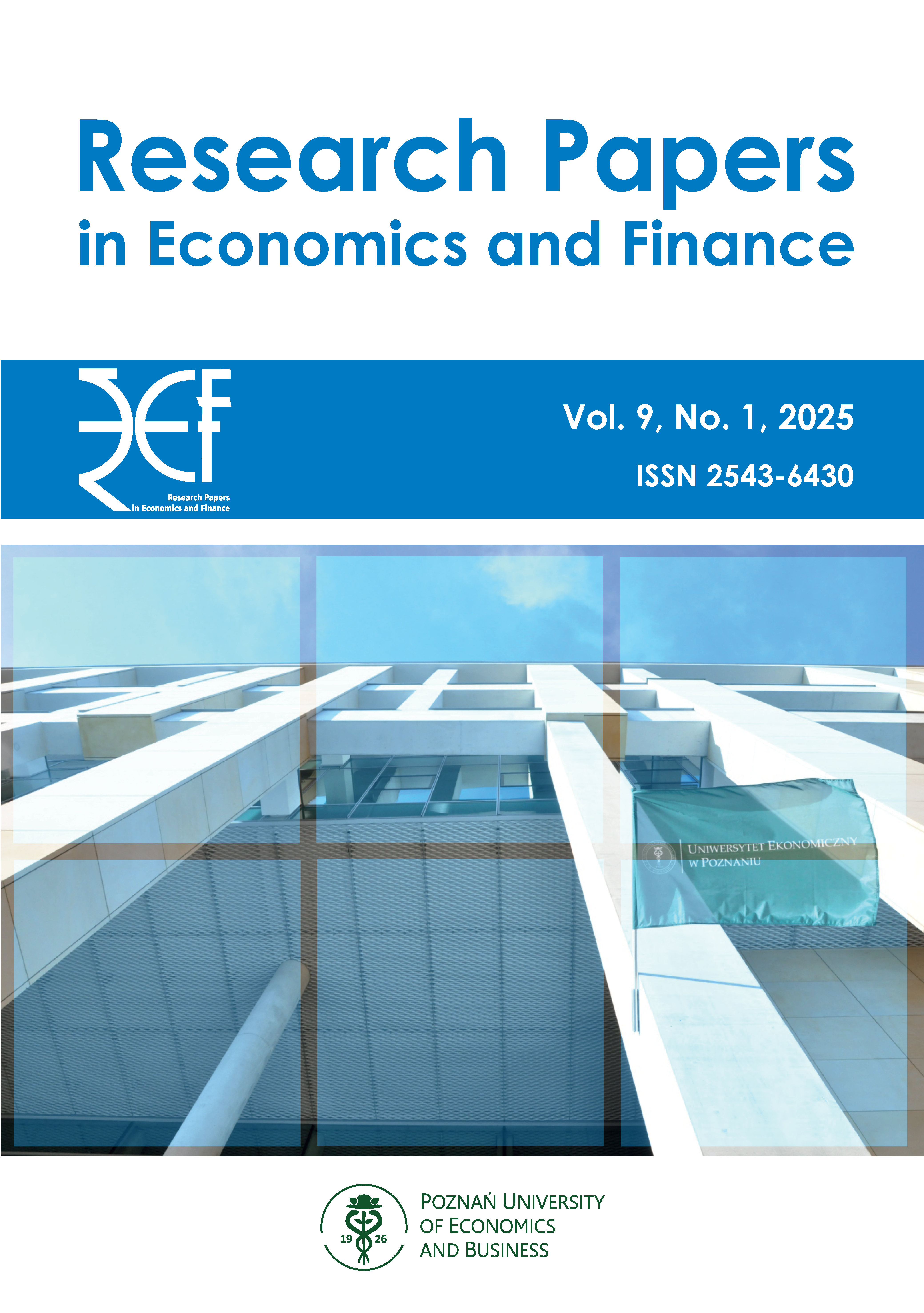Credit card fraud detection and risk management strategies: A deep learning-based approach for EU banks
DOI:
https://doi.org/10.18559/ref.2025.1.2108Keywords:
credit card, fraud detection, deep learning, risk management, EU banksAbstract
This study explores supervised ML-DL based approaches for enhancing credit card fraud detection and improving financial risk management systems for EU banks. This research proposes an ensemble method based on majority voting (Hard Voting Classifier) of deep learning models to detect fraud transaction. Artificial Neural Network (ANN), Convolution Neural Network (CNN), Recurrent Neural Network (RNN), Long Short-Term Memory (LSTM) and Gated Recurrent Units (GRU) have been used as deep learning models. First, the most significant features that affect the type of transaction (fraud or not fraud) have been selected. After that, the ML-DL models were applied. The performance of the proposed approach is tested using a confusion matrix, recall, precision, F-measure and accuracy. The proposed method is tested using accurate data that consists of 540,099 transactions recorded in Kaggle repository dataset of two days based on European card holder for September, 2023. The result shows that the Random Forest (RF) model detected anomalies with 99.99% accuracy, F1-score with 1.00, and excellent recall with 99.99%. As a result, the machine learning model based on RF approach shows promise as a real-time anomaly detection method with high performance and low computational cost.
JEL Classification
Truncated and Censored Models • Switching Regression Models • Threshold Regression Models (C24)
Discrete Regression and Qualitative Choice Models • Discrete Regressors • Proportions • Probabilities (C25)
Downloads
References
BIS. (2024). Annual economic report. Bank for International Settlements. https://www.bis.org/publ/arpdf/ar2024e.pdf
View in Google Scholar
Bolton, R. J., & Hand, D. J. (2002). Statistical fraud detection: A review. Statistical Science, 17(3), 235–255.
View in Google Scholar
Brause, R., Langsdorf, T. & Hepp, M. (1999). Neural data mining for credit card fraud detection. In Proceedings 11th International Conference on Tools with Artificial Intelligence (pp. 103–106).
View in Google Scholar
Buzzard, J. (2022). 2022 Identity fraud study: The virtual battleground. https://javelinstrategy.com/2022-Identity-fraud-scams-report
View in Google Scholar
Chaudhari, A., & Kaur, M. (2025). Enhancing global banking security: A novel approach integrating federated learning and CNN-GRU for effective anti-money laundering measures. Journal of Information Systems Engineering and Management, 10(32s). 1053– 1065.
View in Google Scholar
Chhabra, R., Goswami, S. & Ranjan, R. K. (2024). A voting ensemble machine learning based credit card fraud detection using highly imbalance data. Multimed Tools Appl, 83, 54729–54753.
View in Google Scholar
Chidananda, A. (2025). Deep learning for fraud detection in financial transactions using CNN-LSTM hybrid and GRU Model [Master thesis]. California State University.
View in Google Scholar
Detura, R., Ioshiura, C., Murphy, A., Richardson, B., Scheurle, S., Schweikert, E., & Vancauwenberghe, M. (2022, November 8). A new approach to fighting fraud while enhancing customer experience. McKinsey & Company. https://www.mckinsey.com/capabilities/risk-and-resilience/our-insights/a-new-approach-to-fighting-fraud-while-enhancing-customer-experience
View in Google Scholar
ECB. (2023, May). Annual report 2022. European Central Bank. https://www.ecb.europa.eu/pub/pdf/annrep/ecb.ar2022~8ae51d163b.en.pdf
View in Google Scholar
ECB. (2025, April). Annual report 2024. European Central Bank. https://www.ecb.europa.eu/pub/pdf/annrep/ecb.ar2024~8402d8191f.en.pdf
View in Google Scholar
Ghosh, S., & Reilly, D. (1994). Credit card fraud detection with a neural-network. In Proceedings 27th Hawaii International Conference on System Sciences: Decision support and knowledge-based systems (vol. 3, pp. 621–630).
View in Google Scholar
Khanda, H. A., Stefan, A., Yuhong, Li, & Ali, M. S. (2025). A credit card fraud detection approach based on ensemble machine learning classifier with hybrid data sampling. Machine Learning with Applications, 20.
View in Google Scholar
Kolli, C. S., Tatavarthi, U. D., & Raju, D. V. N. (2023). Fraud detection in banking: AI strategies for financial institutions: Reduce complexity, increase productivity. Lap Lambert Academic Publishing.
View in Google Scholar
Mienye, I. D., & Swart, T. G. (2024). A hybrid deep learning approach with generative adversarial network for credit card fraud detection. Technologies, 12(10), 186.
View in Google Scholar
Misra, S., Thakur, S., Ghosh, M., & Saha, S. K. (2020). An autoencoder based model for detecting fraudulent credit card transactions. Procedia Computer Science, 167, 254–262.
View in Google Scholar
Moturi, S. R., Matta, R, Pavurala, P. K, Kolli, S. K, & B. Nandan K. (2024). Optimizing credit card fraud detection using deep learning by smote-enn technique. International Refereed Journal of Engineering and Science (IRJES), 13(2), 190–200. https://www.irjes.com/Papers/vol13-issue2/1302190200.pdf
View in Google Scholar
Naas, M. N., & H. Zouaoui (2024). Forecasting foreign exchange rate volatility using deep learning: Case of US dollar/Algerian dinar during the COVID-19 pandemic. Research Papers in Economics and Finance, 8(1), 91–114.
View in Google Scholar
Nilson Report. (2020). https://nilsonreport.com/newsletters/1187/
View in Google Scholar
Ren, Y. (2023). Application of machine learning algorithms in detecting credit card fraud: A comparative analysis. Highlights in Business, Economics and Management, 21, 733–739.
View in Google Scholar
Sulaiman, S. S., Nadher, I., & Hameed, S. M. (2024). Credit card fraud detection using improved deep learning models. Computers, Materials & Continua, 78(1), 1049–1069.
View in Google Scholar
Tayebi, M., & El Kafhali, S. (2025). A novel approach based on XGBoost classifier and Bayesian optimization for credit card fraud detection. Cyber Security and Applications, 3.
View in Google Scholar
Vadisena, V. K. R., Radha, V. K. R., Masthan, S. K. M., Balaji, K., Suresh, K. M., & Kolli C. S. (2024). Deep learning-based credit card fraud detection in federated learning. Expert Systems with Applications, 255(A).
View in Google Scholar
Wahab, F., Khan, I., & Sabada, S. (2024). Credit card default prediction using ML and DL techniques. Internet of Things and Cyber-Physical Systems, 4(1), 293–306.
View in Google Scholar
Zareapoor, M., & P. Shamsolmoali, P. (2015). Application of credit card fraud detection: Based on bagging ensemble classifier. Procedia Computer Science, 48, 679–685.
View in Google Scholar
Zouaoui, H., & Naas, M. N. (2023). Option pricing using deep learning approach based on LSTM-GRU neural networks: Case of London stock exchange. Data Science in Finance and Economics, 3(3), 267–284.
View in Google Scholar
Downloads
Published
Issue
Section
License
Copyright (c) 2025 Habib Zouaoui, Meryem-Nadjat Naas

This work is licensed under a Creative Commons Attribution 4.0 International License.

 Editorial Office: Research Papers in Economics and Finance
Editorial Office: Research Papers in Economics and Finance 